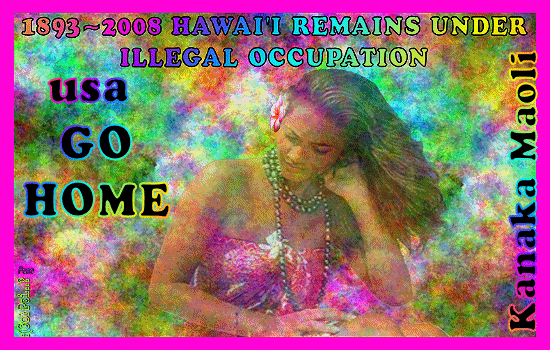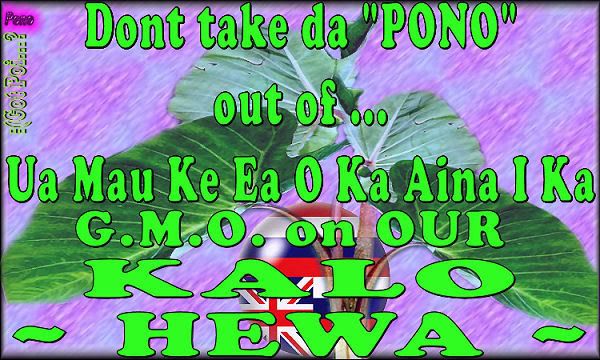
 Protecting Local KnowledgeBy Léo Azambuja, Molokai Dispatch, 27 February 2008Bioprospecting commission seeks to regulate usage of Hawaii’s natural resources.Businesses across the globe are increasingly using native Hawaiian knowledge of Hawaii’s natural resources to produce food, cosmetics, and medicines. While it may seem like an eco-friendly way of facing the future, many in Hawaii are upset that their traditional knowledge is being stolen for commercial purposes.The idea of using local knowledge to create commercial products is called bioprospecting, according to Vicky Takamine, president of ..Ilio..ula o Kalani, a coalition committed to protecting Hawaiian customs and traditions.Takamine, along with the coalition’s executive director, Kaho..onei Panoke, held an informative meeting last week Monday at the Kulana ..Oiwi halau.“Every indigenous people have ownership of their own traditional knowledge,” Takamine said. “We own our knowledge.”The state of Hawaii has no regulations on bioprospecting, according to Takamine.The Legislature passed a resolution on 2006, creating a temporary bioprospecting commission, which Takamine and Panoke are part of. The commission has no funding, making it difficult to gather better input from la..au lapa..au from different islands.This year, Takamine and Panoke are lobbying for a senate bill that would create a funded temporary bioprospecting commission. The bill, SB 151, has already passed three senate committees, and is now referred to the Ways and Means (funding) committee.The temporary bioprospecting commission would expire in 2010, but it may eventually become permanent. It would operate under the Office of Hawaiian Affairs. Commissioners would be in charge of drafting a set of rules and regulations for bioprospecting, as well as a legal definition for bioprospecting.Panoke and Takamine said those interested in bioprospecting would have to receive permission from land owners, the state of Hawaii, and native Hawaiians before collecting samples. A part of revenues from commercialized products would be used to benefit Hawaiian communities.Takamine said rules would protect the intellectual rights of native Hawaiians, whose traditional practices have been handed down from la..au lapa..au for generations.Native Hawaiians are stewards of their natural resources, according to Takamine. She said they “need to work with the state of Hawaii to make sure there are rules and regulations affecting the gathering of those resources.”Don’t blame the kaloThe meeting also served for a brief discussion on a bill asking for a 10 year moratorium on genetic modified kalo.“We don’t want anyone messing with our kalo,” Takamine said.Takamine said SB 958 needs a hearing, and the community should call legislators requesting for it.“There’s a scientist in Hilo who continues to do scientific research on our kalo, taking genes from rice, wheat and grapes and injecting that into the kalo,” Takamine said. The scientist is trying to come up with a stronger variety of kalo, more resistant to pests such as the apple snail.“We didn’t ask them for that,” Takamine said. “Don’t blame the kalo, it’s not the kalo’s fault.”post fromNini'ane
Protecting Local KnowledgeBy Léo Azambuja, Molokai Dispatch, 27 February 2008Bioprospecting commission seeks to regulate usage of Hawaii’s natural resources.Businesses across the globe are increasingly using native Hawaiian knowledge of Hawaii’s natural resources to produce food, cosmetics, and medicines. While it may seem like an eco-friendly way of facing the future, many in Hawaii are upset that their traditional knowledge is being stolen for commercial purposes.The idea of using local knowledge to create commercial products is called bioprospecting, according to Vicky Takamine, president of ..Ilio..ula o Kalani, a coalition committed to protecting Hawaiian customs and traditions.Takamine, along with the coalition’s executive director, Kaho..onei Panoke, held an informative meeting last week Monday at the Kulana ..Oiwi halau.“Every indigenous people have ownership of their own traditional knowledge,” Takamine said. “We own our knowledge.”The state of Hawaii has no regulations on bioprospecting, according to Takamine.The Legislature passed a resolution on 2006, creating a temporary bioprospecting commission, which Takamine and Panoke are part of. The commission has no funding, making it difficult to gather better input from la..au lapa..au from different islands.This year, Takamine and Panoke are lobbying for a senate bill that would create a funded temporary bioprospecting commission. The bill, SB 151, has already passed three senate committees, and is now referred to the Ways and Means (funding) committee.The temporary bioprospecting commission would expire in 2010, but it may eventually become permanent. It would operate under the Office of Hawaiian Affairs. Commissioners would be in charge of drafting a set of rules and regulations for bioprospecting, as well as a legal definition for bioprospecting.Panoke and Takamine said those interested in bioprospecting would have to receive permission from land owners, the state of Hawaii, and native Hawaiians before collecting samples. A part of revenues from commercialized products would be used to benefit Hawaiian communities.Takamine said rules would protect the intellectual rights of native Hawaiians, whose traditional practices have been handed down from la..au lapa..au for generations.Native Hawaiians are stewards of their natural resources, according to Takamine. She said they “need to work with the state of Hawaii to make sure there are rules and regulations affecting the gathering of those resources.”Don’t blame the kaloThe meeting also served for a brief discussion on a bill asking for a 10 year moratorium on genetic modified kalo.“We don’t want anyone messing with our kalo,” Takamine said.Takamine said SB 958 needs a hearing, and the community should call legislators requesting for it.“There’s a scientist in Hilo who continues to do scientific research on our kalo, taking genes from rice, wheat and grapes and injecting that into the kalo,” Takamine said. The scientist is trying to come up with a stronger variety of kalo, more resistant to pests such as the apple snail.“We didn’t ask them for that,” Takamine said. “Don’t blame the kalo, it’s not the kalo’s fault.”post fromNini'ane
